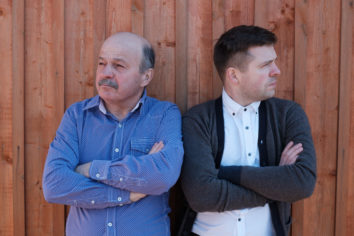How to Care for a Family Member You Don’t Like

While you may have wanted June Cleaver to tuck you in at night, you didn’t get to pick your parents. For those who got the short end of the parental stick, caring for a family member you don’t like can feel like salt in a wound. Creating and executing a care plan for a family member is difficult and stressful. Add in years of mistreatment and neglect, and you have a hot bed of emotional stress.
I have had MANY conversations with adult children and relatives who suddenly find themselves unwilling caretakers. A guy friend of mine suffered severe abuse at the hands of a father he later cared for over 15 years. I asked him how he managed to put years of abuse aside to take care of his father after a massive stroke. Here were his words of wisdom.
Make Choices that Align with Your Personal Beliefs
You may not be able to pull from years of parental modeling of love and nurturing. But, as an adult you live a life of purpose and compassion. You may remember the old wounds and still have scars from mistreatment but you must act in a way that exemplifies your own moral code.
“I was angry at my father for the years of abuse and neglect. But, at the end of the day he was still a human that needed help and compassion. Sure, I was angry at the past. But, I could either follow in his footsteps and practice cruelty and hate. Or, I had the power to care and forgive. I chose to forgive, not for him, but for me”.
Most adult children who agree to care for a family member they don’t like find some peace in the situation. Not everyone chooses the path of caregiving. It is truly a personal decision that must feel right to the individual. Don’t feel pressured to accept a role you fundamentally do not want. Caring for a family member you don’t like requires a lot of emotional and physical work. You need to do what is right for your life.
Create Boundaries
Boundaries help keep the mission clear. If your role is to talk to medical professionals and manage funds, keep to the business. You may have signed up to help. But, that doesn’t mean you have to fall into old patterns – especially toxic ones. As an adult child, you are incontrol of how deep the relationship goes. Open communication with your family member and service providers helps create healthy expectations for the relationship.
Be honest about the extent of your involvement. If you feel uncomfortable spending lots of time with your family member, avoid taking on the direct care role. Remember, you do not HAVE to do anything. Your decision to get involved should be for your own reasons like setting the example for your children, or sharing human kindness.
Take Care of Yourself
It is important to maintain your health and mental wellbeing. You don’t want to burn out or lose focus and that can happen to any caregiver. It is especially important when you don’t want to care for a family member since burn out can come much faster.
Make sure you have emotional outlets you can connect with. You may want to secure the emotional support of a trusted friend. Or seek out the support of a social worker or therapist. While you may have made peace with the injuries of the past, renewal of intimacy and care may bring back old wounds.
Create a Support System
Caregiving is an important and sometimes intense role. Don’t feel like you have to handle every aspect of caring for your family member alone. There are professionals who can help with roles you prefer not to handle:
Fiduciaries – help with financial management and sometimes support clients by arranging medical resources.
Home Health and Hospice – these services are covered by medicare. Your loved one may receive regular visits from medical professionals. The visits are episodic but may give you needed respite and support.
Home Care Organizations – These organizations employ and manage caregivers. If you do not wish to provide daily care, you can find great caregivers to see to the needs of your family member.
Other Family Members – This resource is often overlooked. If you and your siblings share the same history, they may not share a willingness to care for a disliked family member, but might want to support you. By sharing your journey with other family members you may find support you didn’t know existed.
You can find out more about San Diego home care resources in this article:
San Diego Home Care – Everything You Need to Know
Wrap Up
When it comes to caring for a family member you don’t like, you set the rules. Don’t be afraid to honestly consider your motivations for providing care. Armed with that honest information you can set boundaries and create support systems that meet your emotional and life needs.
